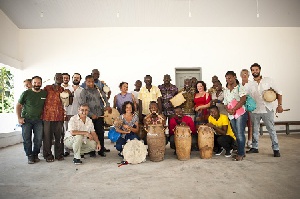The Italian Embassy in Ghana has opened the Italian Cultural Week in Accra with the aim of celebrating the rich Italian culture with Italians in Ghana and the people of Ghana.
The week-long celebration started yesterday with a workshop on “Two Cultures, Same Rhythms” at the University of Ghana, School of Performing Arts.
Anna Nacci, who is a musician, sociologist and Founder of the project “We are the Children”, narrowed her presentation on the topic Tarantism; explaining that many researchers have declared that it was born thousands of years ago in sub-Sahara Africa, and that it crossed through Asia and arrived in Europe about the year 1000.
She said that Tarantism was a trance rite, used to communicate with the gods, to grant grace, or divine healing from a “dark sickness”, a sickness impossible to name 1000 years ago, but today could be identified as a depression.
“Researchers found out that similar rites had existed in Africa, as well as in Asia and Europe and the main character was an animal. The animal is always a kind of animal that bites, like a snake, scorpion, or a spider. For instance, as we can read in the Bible, Saint Paul was bitten by a snake on his way to Damascus. Saint Paul got the light that allowed him to convert to Christianity due to the bite. That could be a legend, or a metaphor, in order to explain that the snake’s bite produced a change”, she explained.
Anna Nacci added that in Europe, after the shaman had disappeared from its culture, another medium was necessary and in Apulia, south Italy, its symbol became the spider. The Latin language for spider is called Tarantula; hence the name “Tarantism”.
Tarantism and its music, according to her, has been the symbolic rite that allowed people to ask god for grace, the way to get the trance and it has been a way to heal depression or express deep feelings and overcome frustrations.
“Tarantism allowed people to ask for grace because life and work were hard, poverty was too much, relationships didn’t work, and marriages were often an issue because they were arranged by parents without children’s agreement, and so on. Anyway music and dance have always been the solution”, Anna Nacci said.
She expressed that Tarantism disappeared starting from the North of Europe, and the last episodes of tarantism took place in Puglia, South Italy; adding, the rite died in the ‘60s because the community culture died at the emergence of TV culture, among other consequences of contemporary evolutions of societies.
Anna Nacci and her musical band Tarantula Rubra demonstrated to the audience the rhythm of the pizzica played by Federico while Alessandra and Franco danced a “love pizzica”, the mating dance of Taranta. The audience was conquered by the irresistible rhythm and the highly symbolic movements of the dance.
Indeed, the workshop and the performance highlighted a still unexplored but very intriguing aspect of Italian culture involving the audience in a very interactive session that brought up common features and possible connections between Ghanaian and Italian culture and artistic expressions.
Other nationalities including Dr Sylvanus Kwashie Kuwor, Department of Dance Studies at the University of Ghana, Legon, students from the Ghana International School (GIS), students from the School of Performing Arts, UG, and some faculty members were among the people spotted enjoying rich Italian culture.
The band will perform at 7pm this evening at the Alliance Francaise, Behind Opeibea House. The event, open to the public and free of charge, promises to be very entertaining and the organizers are convinced that the audience won’t resist the rhythm of the pizzicas and will join the performers in a highly exuberant night of dance.
Organizations and institutions supporting the week celebration include Casa Trasacco, Consar Limited, DE SIMONE GROUP, GhanaWeb Ventures, Ministry of Gender, Children and Social Protection and Department of Architecture (KNUST).
The Italian Cultural Week Celebration continues with the following activities:
- On Saturday October 18 at 6pm, there will be a film titled “Pinocchio” by Luigi Comencini with Nino Manfredi at the Residence of the Italian Ambassador, Dakar Avenue, Airport Residential Area
- Monday October 20 at 10a.m, there will be an exhibition of Italian Contemporary Architecture
- Same day Monday, October 20 at 7pm, there will be another film titled "Generazione Mille"
- On Tuesday, October 21, there will be a film at the Goethe Institute at 7pm titled “Scialla” by Francesco Bruni
General News of Friday, 17 October 2014
Source: www.ghanaweb.com

















